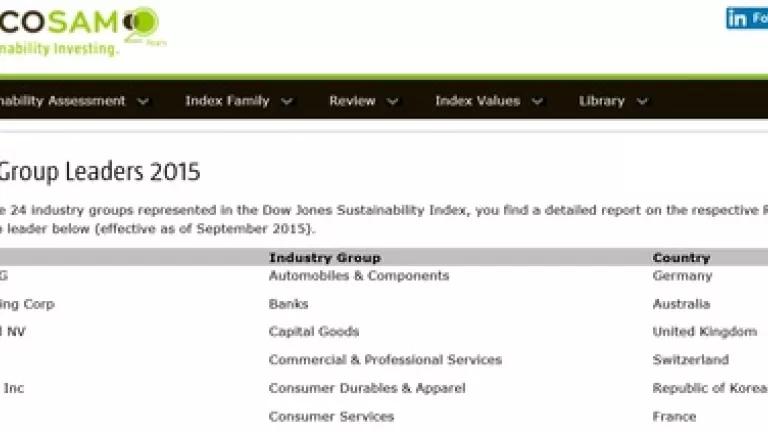Volkswagen takes down corporate social responsibility in its plunge to the bottom of the sea

A few quotes from the latest 156 page VW Corporate Social Report from 2014:
"Our conviction that stable, long term business activity based on ethical criteria is a precondition for acting in and environment-friendly way and playing a responsible part in shaping the future...[applies to our business in all regions around the world]",
Volkswagen tells us on page 14.
"Resource efficiency is a topic of exceptional strategic importance for Volkswagen." (page 93).
"We have learned that sustainability, environmental protection, and social responsibility can be power value drivers" (page 12).
Knowing what we now know has been going on in the company for many years, the irony of some statements in the report seem ready for Hollywood. Volkswagen brags about its "development of new software solutions that...open up additional business opportunities for our company" on page 13. (The "defeat device" that allowed cars to exceed air pollution standards by as much as 40X was a piece of software.) and that the company has seeded sustainability across all departments and brands with a call of having "every individual in our well-informed, qualified workforce to be actively involved [in sustainability strategies, measures and projects, and joint action plans]" (page 27).
Still impressed that the company was "the first and only automaker to commit to the ambitious goal of reducing its European new car fleet average emissions to 95g CO2 by 2020" (page 92)? I didn't think so.
And what are we to make of the fact that the Dow Jones Sustainability Index (DJSI) just this month crowned Volkswagen as the 2015 industry leader for sustainability in the auto sector (??!!) thereby awarding the company the gold star for investors concerned with corporate sustainability performance?
OH MY GOD!
Not yet in the headline news is the broad effect that the Volkswagen cheating scandal may have on the corporate social responsibility movement - a movement that has taken at least ten long years to gain any credibility at all and is now vulnerable to losing it in ten short minutes. Volkswagen may not go down alone here. It will probably severely tarnish this entire movement and may take a few environmental certification and sustainability ranking systems down with it.
Cynics of the social corporate responsibility movement, which has boomed over the past decade, have long questioned the depth, breadth, and sincerity of these voluntary efforts, which generally seem much more like PR advertisements than professional environmental protection programs. In my work on the impacts of globalization, in which companies have fled countries with mature regulatory systems to manufacture in those with neither the technical capacity nor political will to curtail their emissions, I have called out the shortcomings of many of these programs in curtailing pollution from manufacturing abroad, noting that far too many corporate sustainability initiatives are silly side shows designed to draw attention to the cause, rather than to curtail the actual impacts of a company's mainstream production.
And how do we explain that Dow Jones Sustainability Index (DJSI) award? I'll tell you what is going on there, two big problems: First and foremost, the criteria DJSI and other similar ranking efforts, such as the widely used Global Reporting Initiative (GRI), provide more than 100 boxes to click and check, awarding points for a crazy number of sometimes trivial activities that do not direct attention to the issues that matter the most or activities that can actually deliver results. Fundamental matters core to protection of human health and the environment -- like basic compliance with air pollution rules on smog and soot -- are not scored at all or wash out in the clutter of other much less important stuff.
Perhaps worse, these systems are based very substantially on self-reported data from the companies themselves, which are obviously not going to turn themselves in on any problems or weaknesses in their sustainability work.
Of course no evaluation system can be fool-proof and expected to catch sophisticated fraud schemes like the one from Volkswagen. But I've been amazed that environmental professionals, who should know better than to be satisfied with the self-reported nature of corporate sustainability efforts for years, have lent so much cred to these efforts. After all, the PR push around these programs have enabled the biggest companies in the world to go from being legally bound and accountable for their pollution by regulation in the early 1990's -- with permits, inspections, and enforcement in America and Europe -- to writing their own rule books and then shamelessly bragging about successes under those rules in ubiquitous glossy brochures and infographics available around the world. Not exactly progress!
Concurrently, with even more gusto, many of these companies have demonized our EPA, thereby successfully slashing its budget through lobbying Congress year after year and have convinced a surprising number of otherwise thoughtful and intelligent individuals that government oversight is actually keeping corporations from doing the right thing, through its supposed misguided and lumbering rule books.
What are they really up to, some of these companies? We have to re-evaluate based on what we see was behind the curtain at Volkswagen.
